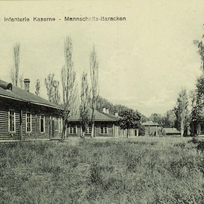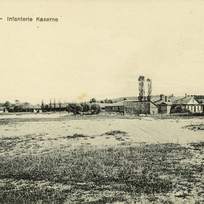Pontoon Barracks, built in the 19th-century end consisted of a dozen wooden buildings arranged in the shape of a rectangle, in the middle of which was an exercise square.
In August 1906, a soldier of the 2nd pontoon battalion of Alytus, called Pontonieris, shared his impressions of life in the pontoon battalions in the correspondence section of the Lithuanian military-revolutionary organization newspaper "Visi za jedno, jednos za visus" in August 1906. At first, he was glad that, although their battalion was stationed in a labor camp far from the city, they were getting newspapers, but they were small. Then he tells the interesting and intriguing event of June 27.
On that day, two companies of the battalion decided to go to work in the afternoon not at 3, but at 4. This was supposed to be a protest against the fact that there were worms in the borscht soup, and that the work was taking longer than scheduled. All the soldiers of the 1st company were not informed about the protest action, so the ignorant people went to work exactly at 3 o'clock. However, when everyone found out that the 2nd company was rebelling, they left their workplaces without listening to and disobeying the orders of the feldfebel. When the commander of the 1st company, Captain Lasovskis, found out about this event, he almost exploded with anger: he screamed, shouted, and threatened a military tribunal and even the court of God. It all ended with the fact that a report was written about the riot that took place, and 20 of the biggest activists were arrested. All the soldiers are "horribly indignant at such a decision of the command, but have decided not to act defiantly for the time being, in order to be able to fight when the nation demands it." And when he finished his story, the soldier, like in current TV shows, sent his best wishes to other units...
During the First World War, German soldiers settled in barracks.
During the First World War, the so-called "Soyuz gorodov" established a hospital in Alytus for the fight against typhus. in 1917 the hospital is housed in the so-called Ponton barracks. Later, the Alytus County Hospital operates here. Several wooden buildings were assigned to the newly created hospital in Ponton barracks. They accommodated the hospital staff and established offices for infectious diseases, surgery, skin and venereal diseases, offices, and a kitchen.
During the creation of the Republic of Lithuania, the buildings of the Ponton barracks were taken over by the Ministries of National Defense and the Ministry of the Interior.
These barracks also housed the Dzūki Forests Office, where the editorial office of the magazine "Girios" was located for a certain period of time. Part of the buildings went to the Alytus rifle team, and a couple of buildings were designated for educational purposes. The former green gymnasium of Alytus was built from these barracks. To this day, several buildings that have become living quarters have survived.
GPS: 54.400478, 24.069616 (WSG)
The author of the photos is Mingailė Kelminskaitė, ancient postcards of barracks from the collection of A. Antanevičius.




Reviews